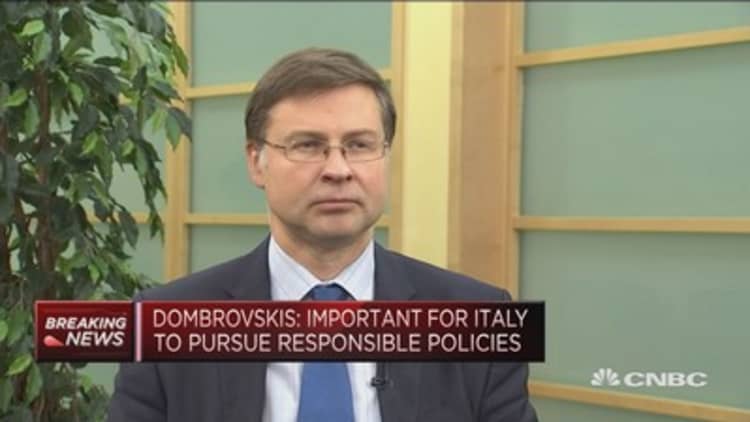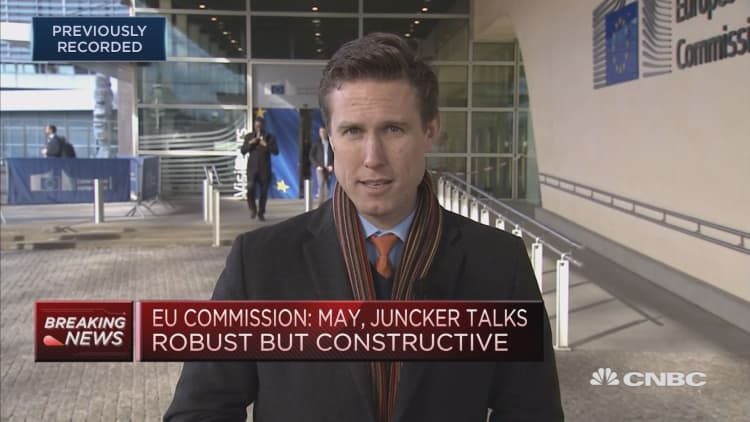With its immense debt pile and potential budget blowout, Italy is a risk first and foremost to itself, Valdis Dombrovskis, a vice president at the European Commission told CNBC.
"Fragility in Italy's economy needs to be addressed," Dombrovski told CNBC's Willem Marx in Brussels Wednesday.
"Given the high level of Italy's public debt, and Italy has the highest debt-to-GDP (gross domestic product) ratio in the EU after Greece, it's important that Italy puts its debt-to-GDP ratio on a downwards trajectory. And this is something which we have (been) consistently emphasizing and we think that this is important," he said.
Italy's debt pile of 2.3 trillion euros ($2.6 trillion) is "first and foremost (it's) a risk factor for Italy itself, but one that needs to be addressed," he added.
Italy's 2019 spending plans, that have caused a furor in recent months with the Commission — the EU's executive arm — were one area of particular concern, he noted.
Dombrovskis' comments come as the European Commission cut its forecast for Italy's growth in 2019 to 0.2 percent, from a previous prediction (made last November) of 1.2 percent. In 2020, it predicts Italy's economy will grow 0.8 percent.
The Commission also lowered its prospects for the euro area as a whole. The 19-member bloc is set to grow 1.3 percent this year, from a previous forecast of 1.9 percent.
"The most pronounced slowdown is in Italy, and we have been in difficult discussions in Italy over the last couple of months on how their chosen fiscal trajectory negatively affects growth. Unfortunately we see this materializing in our winter economic forecast," he said.

Recipe for success?
Italy's anti-establishment government has been admonished by the European Commission in recent months for its 2019 budget plans to increase spending, cut taxes and to row back on some key reforms introduced by the previous administration.
Some of the measures envisaged by the coalition government — of the right-wing party Lega and the anti-establishment Five Star Movement (M5S) include lowering the retirement age (to free up jobs for younger people), introducing a universal basic income for the poor (a M5S initiative), increasing welfare spending and introducing a flat tax rate.
A row ensued with the government and Italy was threatened with what's known as an "excessive deficit procedure" — a disciplinary measure for countries that breach the EU's budget deficit and public debt rules. In order to avoid this, Italy agreed to lower its budget deficit target, to just over 2 percent of GDP by rolling back on some of their more costly budget pledges; EU limits are set at 3 percent.
Ignazio Corrao is a member of the European Parliament (MEP) representing one of Italy's governing coalition partners, M5S. He told CNBC Thursday that Italy's 2019 budget was a new "recipe" for Italy and that the government expected it to have "good effects on the Italian economy" in the second half of the year. "We will see if the results we hope to achieve will be achieved in the second half of the year, or end of the year," he said.
"They are expensive measures, and very different from the economic measures that were used by the last government — they were always saying that we would grow in a certain way and their predictions were always mistaken. So we've changed the recipe and we are still very positive that the results will be good."
Italy's economy is already in trouble, however, with the latest GDP data showing that the euro zone's third-largest economy had entered its third recession in a decade. Italy's GDP fell a quarterly 0.2 percent between October and December, following a 0.1 percent decline in the third quarter, data from ISTAT showed. A recession is defined as two consecutive quarters of declining growth.

Bad elsewhere too
Worryingly for Europe, growth is not only expected to be lower in struggling economies like Italy, however, but in stronger ones too, like Germany and France.
It cut its forecasts for German growth in 2019 to 1.1 percent from 1.8 percent in its previous fall forecast. France is now predicted to grow 1.3 percent, down from the last forecast for 1.6 percent growth. For Europe as a whole (including the U.K.) growth is expected at 1.5 percent, down from 1.9 percent forecast last November.
Dombrovskis said risks affecting EU economies included external factors such as trade conflicts and a slowdown in emerging economies, notably China. There were also domestic factors "at play when we discuss structural and fiscal policies in some member states," he said, citing Italy as a concern.
Francesco Papadia, a senior fellow at European think tank Bruegel, told CNBC Thursday that Italy would remain a "sore point" for Europe.
"It's a large country that seemed to be on a path towards confrontation with the European Union, with the European Commission, but they (the Italian government) has done some correction to what they initially wanted to do (in terms of spending) and that was seen as being enough by the Commission not to start an excessive deficit procedure but still, Italy remains a lukewarm member of the euro area," he told CNBC's Willem Marx in Brussels.
'Governments haven't done enough'

Germany is expected to have just avoided a technical recession in the fourth quarter after growth contracted by 0.2 percent in the third quarter.
Whether it avoided a recession or not, the growth levels are worryingly low in its traditional growth driver Germany, and wider Europe, analysts said, especially after years of ultra-low interest rates and extraordinary monetary stimulus by the European Central Bank, which is expected to soon be coming to an end.
"Whether growth (in the euro zone) is minus 0.1 percent or 0.5 percent, it's too low to fulfil the aspirations of the European population," Moritz Kraemer, a former chief sovereign analyst at S&P, told CNBC Thursday.
"And it's too low in order to make the public finances in a large number of member states stable enough to provide a counter-cyclical buffer if it is needed in the next real downturn," he said, noting that national governments in the region had not made enough efforts to repair their finances while interest rates were low.
"It's lamentable that during the good years that are apparently coming to an end now in Europe and elsewhere, governments haven't done enough to repair their balance sheets," he told CNBC's "Squawk Box Europe."


